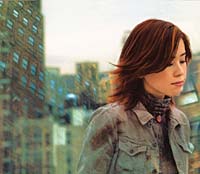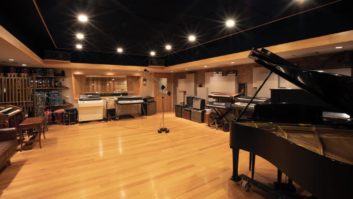
Captivated by music from around the globe, Japanese composer YukiKajiura absorbs it all and unleashes it in her work for movies,musicals, video games and, especially, anime, that ever-growingsubgenre that is giving American animation increased competition.Kajiura is a perfect fit for the anime realm, for it is a genre thatembraces musical eclecticism.
The composer’s two most recent anime series are Noir and.hack//SIGN, the latter of which has aired on Cartoon Networkand both of which are available on DVD from ADV and Bandai,respectively. Noir is a tale of intrigue revolving around a Frenchassassin-for-hire who is linked to an amnesiac teen who somehow knowsabout her past and who has deadly killing skills! .hack//SIGN isa fantasy tale about a virtual computer game in which its enigmaticlead character has forgotten his identity and is unable to log out likethe other players.
The world of anime composing is vastly different from feature films.Unlike those who score for live action, Kajiura does not watch afinished or even a rough cut of the series she writes for. Instead, shereceives character sketches and some information about the story, butthat is all. “I don’t know how the story goes. I don’t know ifshe will live or die,” she reveals. “When I look at thepictures, I don’t know what she’s going to do. When I write lyrics, Idon’t know what [the characters] will do, so what shall I write? I’malways confused.”
Because she does not know what scenes she is scoring for, Kajiurasometimes ends up being surprised at the choices made by musicdirectors. Koichi Mashimo directed both series, and the musical choiceswere often unorthodox. For example, the main theme to Noirincorporates dance beats and operatic female vocal; fast-paced musicwas often placed in slower-moving, more suspenseful sequences,generating an odd contrast.
“I was surprised, too,” admits Kajiura. “Mr.Mashimo is a very interesting person. In Noir, he [acted] asmusic director and chose the music. Sometimes, I was surprised at themusic he was using [in certain spots]. It was very fun. Mr. Mashimouses music for a very long time throughout the scene. I sometimes writevery long pieces for BGM [background music] as a soundtrack. Sometimes,I write six- or seven-minute songs, [but] the music is usually notmeant to be used for that long.” For Noir alone, whichlasted only one season, as many anime series do, Kajiura composedbetween 60 and 70 cues of varying lengths.
Some of the Noir pieces highlight am accordion to give thescore an appropriate French flavor. The ethereal opening to.hack//SIGN mixes Indian vocals with Irish-sounding violins.“I have no intention of making this music on purpose,”Kajiura confesses. “It just comes naturally. I love a lot ofdifferent music. I love pop music, I love world music, I love opera, soI want to do many things, and I don’t hesitate to do them. I justlisten. I like Finnish music, and I love Romanian music. I listened tothem [in the past] and thought that, someday, I would do [somethingwith them]. I feel that anime fans are very flexible listeners. Animefans like the classics, they are into pop, they love worldmusic.”
Kajiura’s intuitive approach to style stems from a childhoodengulfed by music. Her father loved opera, and when she was young, hewould make her play piano pieces for him. “At first, I dislikedplaying piano for him,” Kajiura recalls. “I was an onlychild, so I wanted to go out and play. But he made me play the pianofor him; he liked beautiful music, and I gradually came to loveit.”
Interestingly enough, she says that she got a late start in thebusiness, quitting the 9-to-5 world when she was 27 to become aprofessional musician. Given her extensive resume, the 38-year-oldcomposer has made up for lost time. She loves musicals and has writtenmusic for five of them. She has also scored movies and video games.
Kajiura uses a G4 Power Mac and records and mixes in Pro Tools. Hermain keyboard is an Ensoniq SR-76, her main synth is a Korg Triton andher main sampler is an old Akai 3000. She uses Digital Performer as asequencer. When playing sampled instruments and editing, she records athome, generally working with anywhere between 30 and 64 tracks, thenheads to local studios to record live musicians and singers.
“In making music, I just feel [whether] it’s good for livemusicians or not,” Kajiura explains. “It’s case-by-case.When I can use live musicians, I do, but sometimes a sampled sound ismore effective.”
In the case of an accordion in Noir or classical guitar in.hack//SIGN, those were played live. “I don’t think thefeeling of an accordion can be done by a sampler,” she says.“Classical guitar cannot be played by samplers, I believe, sowhenever [I need them], I call musicians to come and play. In the caseof strings, sometimes I use sampled sounds when I feel the sampledsounds are good for what I’m using. Mainly, I want to use real strings!The violins are always real.”
The bulk of her CD material comes in the form of anime. In Japan,three soundtracks (one of them vocal-oriented) were released for Noirand four were released for .hack//SIGN. Anime soundtracks are abig business there. Additionally, her work in the pop duo See Saw, whoperform the song “Indio” in Noir, a tune from herteenage years, is available on disc, as well, including the recentrelease, Dream Field. Kajiura recently released a solo albumthrough Pioneer called Fiction, which includes three vocal songsapiece from Noir and .hack//SIGN sung in English.
No matter what she does, Kajiura throws herself into the mix, so tospeak, to create fresh sounds. And the medium of anime allows her tostretch her wings as she has more musical leeway in what she composes.In working on Noir and .hack//SIGN, she felt no pressureto conform to the director’s vision. “He just says, ‘Dowhat you want to do,’” explains Kajiura. “That’s Mr.Mashimo’s way. He always says that, so I do what I want! I enjoyed thiswork very much. Noir and Dothack were so fun for me. Ididn’t recognize them as soundtracks, I simply made music.”

